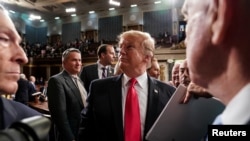President Donald Trump spent 20 percent of the annual State of the Union speech on Tuesday talking about illegal immigration. In fact, he spent more time on the issue than any other previous president, according to a CityLab journalist who documented use of related terms in every one of the annual presidential addresses.
This is not new for Trump, of course. Since he began his presidential campaign, he has made regular comments highlighting what he sees as a “crisis” at the southern US border, which in his view, requires construction of a border wall. He almost exclusively discusses immigration in terms of the undocumented community, and how dangerous he perceives them to be. (But the link between immigrants and crime is just not there despite Trump’s repetition).
Moreover, his insistence on the issue is out of step – especially the wall – with how the majority of Americans see it.
Sixty percent of Americans oppose such new major construction according to Gallup poll results released this week.
And last month, Quinnipiac University Poll data showed that three in five Americans believe the wall is not a good use of taxpayer dollars and that a wall is not necessary to protect the border. More than half believe the border wall is “against American values” and would not make the U.S. safer.
“One of the reasons the president is trying to shore up support for the border wall is because it is unpopular,” Todd L. Belt, director of the Political Management program at George Washington University. “Two-thirds of Americans do not support the use of an emergency declaration in order to fund the border wall. They would rather see Congress approve of those fundings. And so that's one of the reasons why he remains trying to change the narrative into one of crime, into one of danger, instead of giving immigrants a chance and also giving refugees a chance to come to the United States.”
Trump faces another challenge in the coming weeks, as Congress struggles once again with budgetary decision-making in the face of the president’s insistence on funding for a border wall. In December, the issue turned into a 35-day-long partial government shutdown, and lawmakers have until Feb. 15 to finagle a deal in a split Congress.
More legal immigration?
Trump made one outlier comment on Tuesday that raised eyebrows among those who are politically aligned with his generally immigration-restrictionist stance: “I want people to come into our country in the largest numbers ever, but they have to come in legally.”
This is curious for two reasons: first, Trump almost exclusively discusses immigration in terms of illegal immigration, linking it to crime and violence. Second, he has shown little - if any - indication of wanting to expand legal immigration.
In fact, much of Trump’s immigration agenda overlaps with those from groups that advocate for restricting all immigration, so the idea of aiming for record numbers rankles in those circles. One such group, NumbersUSA, responded to the president with incredulity.
“Last year Pres. Trump promised to end visa lottery and chain migration, and he endorsed RAISE Act… Immigration numbers are already at an historic high. Did he misspeak? Let’s hope so.”
Perhaps Trump’s comment about legal immigration is a hint at a bargaining chip for discussions with Congress. But while Trump said that he would order more troops to the southern border and reiterated the type of wall he wants built, and why he believes these things are necessary, he offered no policy in the speech that would support welcoming the “largest numbers ever” of immigrants.
Given that, as VOX reported this week, visa denials have increased under the Trump administration, and Trump has targeted specific legal immigration paths - like the U.S. refugee program - for massive cuts, and threatened to slash others, like the diversity visa lottery, the path toward a compromise with Congress by next week and any attempt to expand legal immigration seems difficult to reach.
“I don't see that any white flags went up the during or after the speech on the issue of the wall,” said political analyst Sherry Bebitch Jeffe, a professor at the University of Southern California. “I didn't see much there that would lead me to believe that particularly on the wall and particularly before February 15… that there would be any compromise.”
VOA News Center's producer Jesusemen Oni contributed to this report from Washington.





